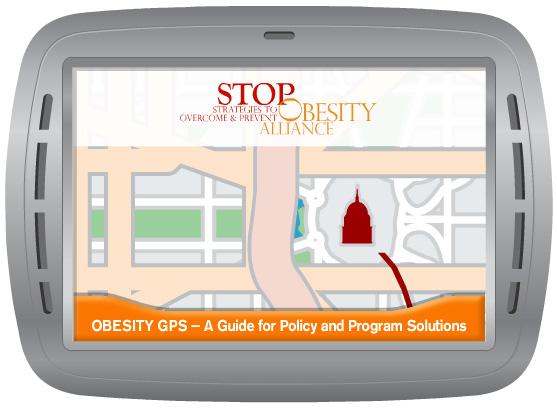Click here to download the PDF
WASHINGTON, D.C. – The Strategies to Overcome and Prevent (STOP) Obesity Alliance today released the Obesity GPS – Guide for Policy and Program Solutions, the first navigation tool developed to guide public and private decision makers as they determine the most successful routes towards reducing the overweight and obesity epidemic, which costs the United States at least $92.6 billion annually, and affects the lives of two out of every three adult Americans1.
“Policies and programs designed to take on the obesity epidemic are well-intentioned, but not always effective,” said Christine Ferguson, director of the STOP Obesity Alliance. “The Obesity GPS provides direction on the primary issues that must guide any and all efforts to realistically and effectively reduce our national obesity epidemic.”
The Obesity GPS is a set of multi-layered questions that decision makers can apply in the development or evaluation of the most common types of proposals: specific health interventions, policies aimed at health care professionals, or research initiatives. The Obesity GPS is divided into four main sections that highlight the important questions that decision makers should consider related to overweight and obesity in our nation. The Obesity GPS also provides a rationale statement supporting the question for decision makers to consider as they plan their policy or program.
“As Surgeon General of the United States, I agreed with my fellow health care professionals, scientists, and public health leaders that we needed an evidence-based compass to help steer our decisions when developing programs and advising policymakers about health challenges related to overweight and obesity,” said Richard H. Carmona, M.D., M.P.H., FACS, 17th Surgeon General of the United States (2002-2006), President of Canyon Ranch Institute, and Health and Wellness Chairperson of the STOP Obesity Alliance. “Today, every sector of society — from houses on Main Street to both Houses of Congress – can use the Obesity GPS that the STOP Obesity Alliance developed this year to help guide decisions that will impact the health, safety, and security of our great nation for generations to come.”
The STOP Obesity Alliance’s Steering Committee collaborated to develop the Obesity GPS, leveraging the diverse group’s broad expertise and perspectives that range from health care professional and consumer organizations, business and labor groups, and insurers and research groups. With its research team based at The George Washington University, the Alliance will also use this resource to evaluate whether proposed policies and programs will have a real-world impact and make a difference in overweight and obesity.
Since its inception in May 2007, the STOP Obesity Alliance has grounded its work to help reverse America’s obesity epidemic in two major areas: leveraging evidence-based research to reveal societal and economic obstacles to addressing overweight and obesity, and developing policy recommendations to overcome the current barriers. When released, the policy recommendations focused on the areas with the potential for making the highest impact. The Obesity GPS builds on this platform with the creation of a user-friendly tool.
“Since obesity results from so many factors — environment, caloric balance, lack of access to healthy foods, poor nutritional knowledge, physical inactivity, and genetics — we need to pair personal responsibility with efforts that address the larger environment involving multiple stakeholders,” Ferguson said. “We have to change course. Tools like the Obesity GPS will help to reduce confusion, leverage research and offer our Steering Committee’s diverse and collective expertise in a way that makes it easier for policymakers to create a difference.”
About Overweight and Obesity
Affecting 60 million adults, the overweight and obese population is one of the fastest growing segments in American society. Weight-related chronic disease — diabetes, heart disease, and certain cancers– is the country’s second-highest cause of preventable death behind smoking.
1 http://www.cdc.gov/nchs/products/pubs/pubd/hestats/overweight/overwght_…


